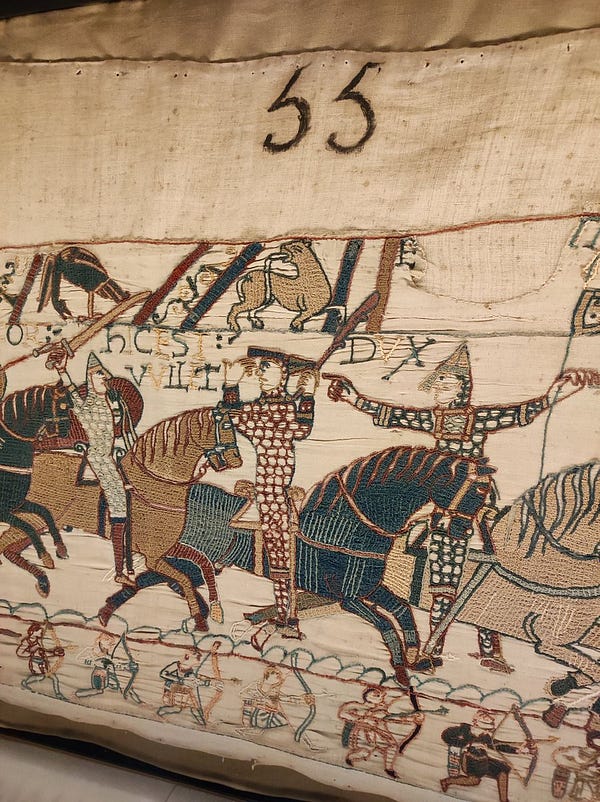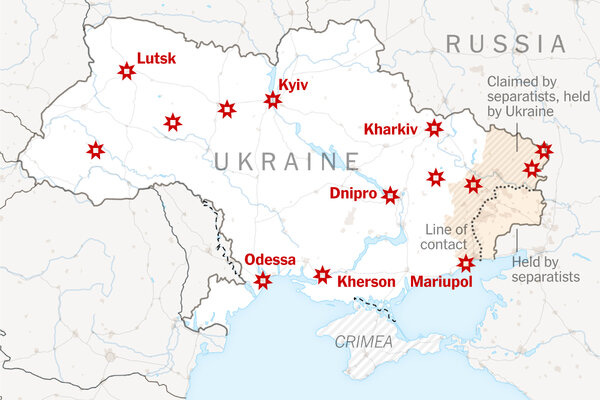CONDITION: War in Ukraine:
I want to believe that this is not stage-managed to make Putin look dominant, but in fact reflects the shakiness of Putin’s internal position. I want to believe…
Anton Troianovski: ’Another extraordinary televised Kremlin meeting, this one with oligarchs. The head of the industrialists’ lobby group tells Putin to avoid wrecking the Russian economy further in responding to Western sanctions; Putin responds describing today’s invasion as a “necessary measure” <https://t.co/4jwQG1fmJM> <
First: Sleepwalking into History…
Noah Smith has a very nice piece d’occasion:
Noah Smith: A Moment of Clarity: ‘For the last two decades we’ve been sleepwalking through various dreams of our own creation, willfully blind to the dangers…. It is time for those dreams to end now. The alarm clock is ringing…. [The] “Long Peace”…created the space for global trade, investment, and migration to flourish, creating an economic boom that benefitted first the developed nations, and—after 1990 or so—the developing nations as well. That Long Peace was dealt a critical blow in 2003, when the U.S. invaded Iraq on flimsy pretenses…. But the U.S. didn’t conquer Iraq. Iraq an independent country, more closely allied with the U.S.’ main regional rival, Iran.
Putin’s seizure and annexation of Crimea… [was] a great power using its military might to add to its territory…. The Russian invasion of Ukraine is different both quantitatively and qualitatively. It represents a great power simply declaring that a weaker country has no sovereignty…. The norm that kept the peace since World War 2… is no longer…. The law of the jungle has returned… dramatically increas[ing] the incentives for nuclear proliferation… push[ing] countries toward great-power alliance blocs….
In recent years, some libertarians have been talking about the idea of walking away from what they see as overbearing governments and stifling society…. Russia is making it even clearer that this strategy is doomed, because eventually there is nowhere to run…. Thus it is very very important to every libertarian that the U.S. not collapse. This means supporting public goods—a strong industrial commons, strong infrastructure, robust investment in science and technology, a functional legal system, and all the rest. I wrote about this back in 2011, and called it the Tamerlane Principle: “Tamerlane is always over the horizon, waiting to strike. There will always be conquerors waiting for the chance to conquer and pillage the soft civilized nations of the world….”
Many leftists got the Russia-Ukraine conflict very, very wrong…. This about-face has not been universal. Jacobin, for example, continues to blame the U.S. for Putin’s aggression…. But mostly, the roar of Putin’s bombs seems to have jolted the Left from their sleep.
Villains on the Trumpist Right: Unfortunately, the same cannot be said of the Right…. The world for 70 years enjoyed the greatest flourishing of prosperity, culture, and human achievement in all its history. Now those norms are gone, torn up by jealous, petty men who never lived to see what a world ruled by the law of the jungle is like….
We must go into this crisis with open eyes, discarding the illusions we spun for our own consumption when we took peace for granted. We can no longer afford to treat our wealthy liberal society as a fatted calf to be slaughtered and parceled out by faction…
LINK:
The last paragraph of my Slouching Towards Utopia (forthcoming September 6 <https://bit.ly/3pP3Krk>) is about the world after 2010: “A new story, which needs a new grand narrative that we do not yet know, has begun.” The story of the Long 20th Century of 1870-2010 ended in 2010, I argue, with a substantial number of seismic shifts occurring more-or-less at the same time: the collapse of America’s hegemonic role in economic and in geopolitical leadership, failure to keep income and wealth inequality within bounds, the emptiness of claims by neoliberal technocrats that they got economic management, political institutions that repeatedly failed to even begin to grapple with global warming, a sputtering (but not stalling) of the underlying global-north engine of productivity growth. Plus in 2010 the great and good of the global north were about to fail to prioritize a rapid restoration of full employment, and then fail to understand and manage the discontents that would bring, which discontents would in turn bring neofascist and fascist-adjacent politicians to prominence worldwide.
I confess I had not expected that the grand narrative of the 21st century would have to find a place within itself for the return of major-power (i.e., not civil) war.
From 1870 on there had been a social darwinist current in the forces pushing for war—nations deprived of their rightful access to resources, proletarian nations rather than proletarian classes, for whom both a test of their fitness and thus evolutionary prowess and also their rights to fair distribution required that they start the laughter of the guns. Yet it was so, until 1945. As Max Weber, a pro-democracy German liberal of his day, put it back before World War I, the struggle between nations was primary <https://www.bradford-delong.com/2017/09/after-world-war-i-weber-hoisted-from-ten-years-ago.html>:
We all consider the German character of the East as something that should be protected…. The economic struggle between the nationalities follows its course even under the semblance of 'peace'. The German peasants and day-labourers of the East are not being pushed off the land in an open conflict by politically-superior opponents. Instead, they are getting the worst of it in the silent and dreary struggle of everyday economic existence… abandoning their homeland to a race which stands on a lower level…. There can be no truce even in the economic struggle for existence…. The vulgar conception of political economy is that it consists in working out recipes for making the world happy…. [Reality] prevents us from imagining that peace and happiness lie hidden in the lap of the future…. Elbow-room in this earthly existence can [only] be won… through the hard struggle of human beings with each other.... The economic policy of a German state, and that standard of value adopted by a German economic theorist, can.. be nothing other than a German policy and a German standard.... Our successors will… us responsible before history for… the amount of elbow-room we conquer…. The ultimate and decisive interests at whose service economic policy must place itself are the interests of national power... and the vehicle of that power, the German national state...
As it was then, so it is now, especially for Weimar Muscovy, National Hinduist India, and Willemine China.
It is not clear whether their leaders actually believe that the people of their nations have concrete important interests at stake in domination, or whether it is primarily an internal-political move to attempt to busy giddy minds with foreign quarrels. How far Muscovy will go or attempt to go with Ukraine, the Baltics, and the rest of the "near abroad”; China with the Chinese-Indian borderlands, Russia’s maritime province, and Taiwan and the Ryuchus; India with Pakistan—that is all in the lap of the future, with the chances that they will go and try to go further greatly increased by the perception that their targets are soft ones. (The Iran-Israel-Arabia dynamic is an example of similar forces under conditions in which nobody perceives the targets as soft.)
Major-power war is now back on the agenda. But I confess that I cannot clearly see what shape it will take. Our conventional weapons are now so destructive that war-as-a-social-practice will not be carried out via total industrial mobilization and then by the weight of metal and morale, but it will rather be in some other mode that will then, at some point, turn back into politics.
This struck me as smart:
Paul Poast: ’How will Russia’s invasion of Ukraine play out? What is Putin’s end game? I see four scenarios…. Scenario 1…. Putin seeks to establish a pro-Russian regime in Kiev… “supported”, indefinitely, by Russian forces. Scenario 2…. Putin seeks to annex all of Ukraine into Russia. Scenario 3: Imperial Overreach: Putin’s ethno-nationalism, combined with security paranoia, leads him to seek recreation of the entire Russia Empire/USSR. All of the “near abroad” is the next target. Scenario 4: Major Power War Putin specifically shifts his focus to the Baltic States. Despite being NATO members, Putin, in his mind, senses an opportunity to strike and correct the mistake of letting them “join the West”. Which scenario is most likely? It depends on two factors. First, are Putin’s aims Maximalist or Limited? Second, the operational ease of invading Ukraine…
LINK:
And then there is Scenario 5: Partition—annex Donbas and Crimea to Russia, turn Kyiv, Dnipro, and Odessa into separate independent client states, let Lviv join the EU and NATO. The Sudetenland Playbook might well suggest that to Putin—and, after all, it did almost work for Hitler.
And we can all hope for Scenario 6: Failure by Putin to win his "short victorious war" brings a color revolution to Moscow…
One Video:
Waterloo (1970): ’Starring Rod Steiger & Christopher Plummer… <https://www.youtube.com/watch?v=3DcWJrzK0wU>:
One Picture:
Very Briefly Noted:
Jag Bhalla: It’s Time We Stop Listening to Economists on Climate Change: ‘Economic models of climate change are so riddled with flaws and fudge factors that we’d be better off without them… <https://undark.org/2021/11/11/its-time-we-stop-listening-to-economists-on-climate-change/>
Eric Basmajian: _’There’s been a lot of movement in the belly. We’re pulling hikes forward and expecting them to end sooner… faster and shallower…


Willem H. Buiter: The Case Against Fed Gradualism: ‘After two decades of never raising policy rates by more than 25 basis points at a time…. If the Fed proceeds too slowly, it will jeopardize its own credibility… <https://www.project-syndicate.org/commentary/fed-rate-hikes-slow-is-dangerous-by-willem-h-buiter-2022-02>
David Adam: The Pandemic’s True Death Toll: Millions More than Official Counts: ‘Countries have reported some five million COVID–19 deaths in two years, but global excess deaths are estimated at double or even quadruple that figure… <https://www.nature.com/articles/d41586-022-00104-8>
David French: We’re All Ukrainians Now: ‘How healthy patriotism helps us extend our compassion and concern…
Josh Barro: Rick Scott Just Gave a Huge Gift to Democrats <
Matthew Klein: How Should the Federal Reserve Tighten?: ‘Among the possibilities for America’s monetary policymakers: -Squeeze bank lending without raising interest rates (at least not very much). -Raise short-term market interest rates while maintaining positive net interest income (potentially with the help of the Treasury). -Increase bond risk premiums faster than they shrink the balance sheet…
Jonathan Lambert & Dave Levitan: Cancer Isn’t One Disease, It’s 200: ‘Biden’s revised Cancer Moonshot reflects that… <https://www.grid.news/story/science/2022/02/07/cancer-isnt-one-disease-its-200-bidens-revised-cancer-moonshot-reflects-that/>
Tom Maher: ’A concise piece of storytelling (the tapestry is full of them) is amid the chaotic depiction of the Battle of Hastings—William raises his visor to show he has not been killed, as some had worried, and a lieutenant then affirms the identification and relays it to those nearby…


Timothy Snyder: Putin Has an Exit from the Conflict: ‘It’s just that he might prefer the road to war…
Clare People: Maire Rua <https://www.clarelibrary.ie/eolas/coclare/people/ruadh.htm>
Paragraphs:
Robert Shapiro: Note to Reporters: Americans Are Better Off Even After Inflation: ’Conventional wisdom [is] inflation has left most Americans poorer. It’s… odd… the number of people with jobs jumped by 4.7 percent in 2021, and the economy grew by 5.7 percent…. If people are poorer, why did household spending jump by 8.8 percent in 2021, after inflation, including increases of 25.8 percent for clothing and shoes and 11.6 percent for home furnishings? The reason the conventional wisdom doesn’t seem right is because it’s wrong…
Wallace Witkowski: Intel’s ‘Absurdly Bullish’ Long-Term Forecast Sends Stock to Lowest Point since 2020: ‘Another delay in a chip rollout Intel’s 7-nanometer data-center chip codenamed “Granite Rapids”… pushed into 2024…. [Can] Intel… command enough market share in data center and graphics to pull off 10% to 12% growth by 2025…. “Considering 1) Intel’s recent history of poor execution, and 2) its own projection for zero FCF for the next three years, we think investors will need to see hard, concrete evidence that the huge investments Intel is making will pay off,” [Mark] Lipacis said. “We don’t expect that for at least another year”…
Glenn Loury: Identity Politics vs. Excellence: ‘Changing the standards that determine who gets admitted to our top schools and who gets hired in our top academic departments… not just… giving a boost to individuals who happen to be members of historically underrepresented minority groups… intervening in a meritocratic vetting process that identifies and cultivates individual talent, creativity, and innovation and transforms it into far-reaching social and scientific change…. [These are] the real stakes of affirmative action. I do not endorse dismantling affirmative action altogether…. If we prioritize diversity and proportional representation over academic excellence, we may end up debilitating our academic and governmental institutions. Are we willing to take that risk?…
LINK:
Erik Brynjolfsson: Is the Great Stagnation Finally Coming to an End?: ‘A wave of powerful technologies, particularly… AI and machine learning…. mRNA vaccines… solar power…. The economics of powerful technologies typically follows a “J-curve”…. The pandemic accelerated 20 years’ worth of digitization into 20 weeks…. Individuals, companies and industries are rapidly learning how to work digitally…. Creating intelligent machines is arguably a more important invention than just about any other invention we’ve ever made. Leading firms have been investing in business process redesign and business model reinvention…. This digital capital is the harbinger of productivity growth…
LINK: <https://www.pairagraph.com/dialogue/9301beaf3a5b4a14868c682a36402474>
PAID SUBSCRIBER ONLY Content Below:
Subject: Things I <strike>Someday Hope to</strike> Almost Surely Will Never Understand: QM Edition
So what do I read in order to have a chance of understanding this paragraph below?
Sydney Coleman: Quantum Mechanics in Your Face: ‘Some, maybe all, self-adjoint operators are “observables”. If the state is an eigenstate of an observable A, with eigenvalue a, then we say the value of A is a, is certain to be observed to be a.... There’s an implicit promise in here that, when you put the whole theory together and start calculating things, that the words “observes” and “observable” will correspond to entities that act in the same way as those entities do in the language of everyday speech under the circumstances in which the language of everyday speech is applicable. Now to show that is a long story. It’s not something I’m going to focus on here, involving things like the WKB approximation and von Neumann’s analysis of an ideal measuring device, but I just wanted to point out that that’s there…
I mean, I get that in matrix mechanics you have a quantum-state variable, and its evolution over time is given by a self-adjoint operator—a unitary matrix that describes the forces at work, and that you multiply the state variable in the past by in order to get the state in the present.
But, then, why, when you do not ignore but instead focus on how that matrix multiplication process entangles the state variable with the environment in such a way that you can and do make a “measurement”, does the resulting “reduction of the wave packet” generate measured values that are eigenvalues and only the eigenvalues a of A?
It makes me very sad that I will almost surely die before I have ever understood this…
















Perhaps Noah made the point in passages you elided, but his comparison of Left and Right lacked a basic distinction: the putative Left is tiny and marginal, while the Right now encompasses most, if not all, of the R party.
Wave function collapse is an exogenous postulate glued onto the body of quantum field theory; nobody has succeeded in deriving it from the assumption that the wave function is the fundamental description of reality, although hope springs eternal. In short, the measurement problem is the basic problem with quantum theory, it has been there from the very beginning, and nobody understands or has ever understood the answer. So I don't know why you expect to.
That said, I think it would profit you to read what Sabine Hossenfelder has to say here: http://backreaction.blogspot.com/2022/02/an-update-on-status-of-superdeterminism.html. I was particularly interested to learn that von Neumann proposed the same experiment 50 years ago, and that it has never been tried, and that the reason is that the community of physicists prefers to sacrifice locality rather than statistical independence, and that there is no empirical basis for this preference.